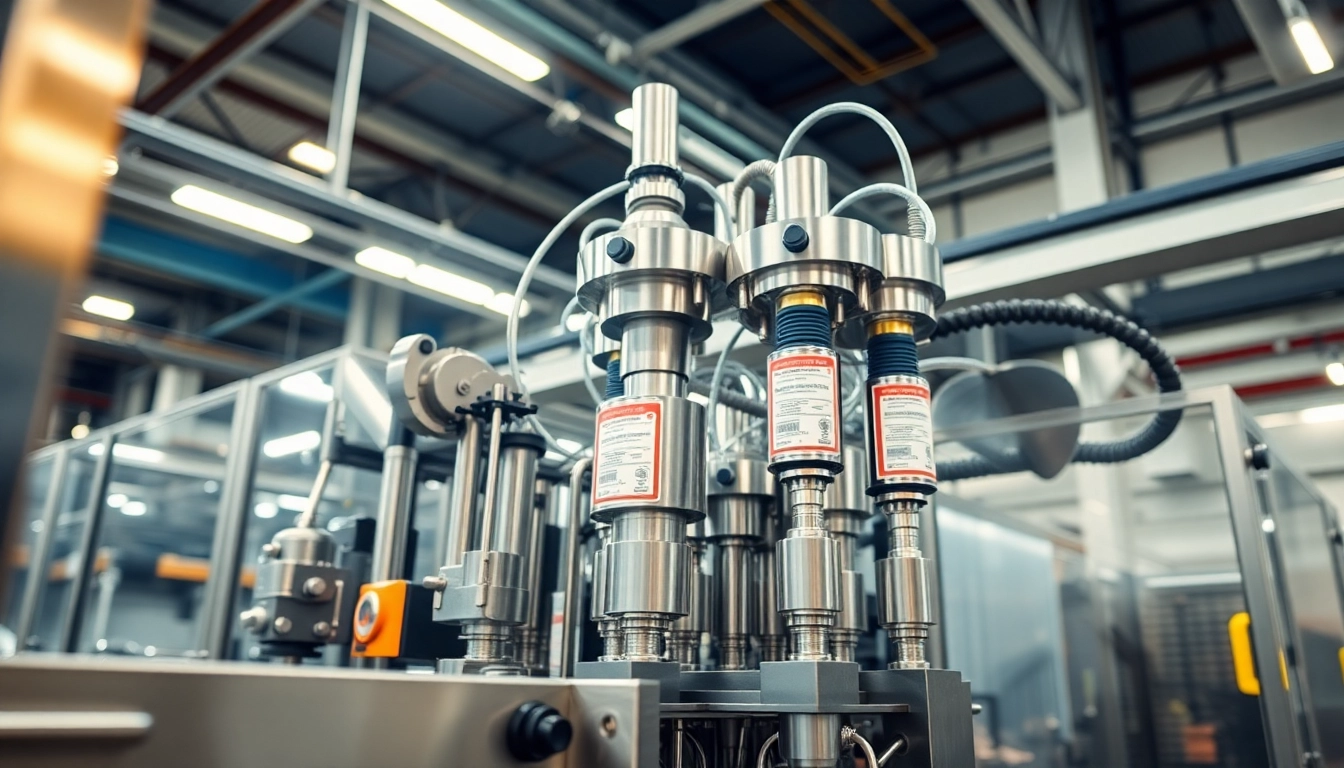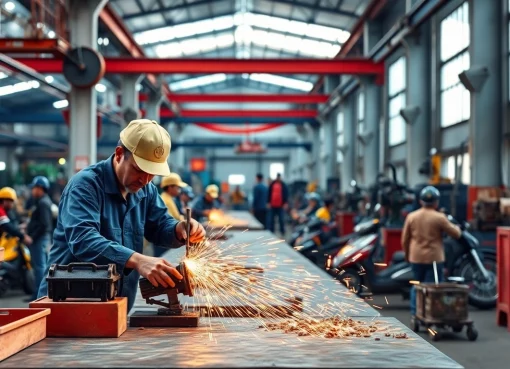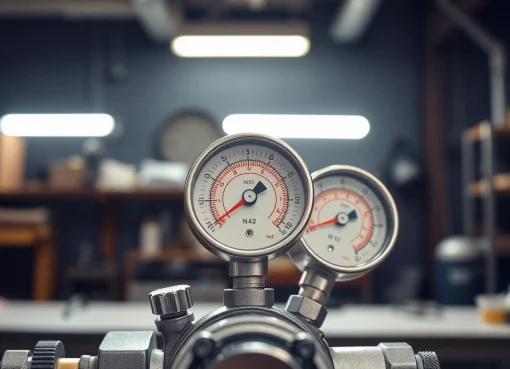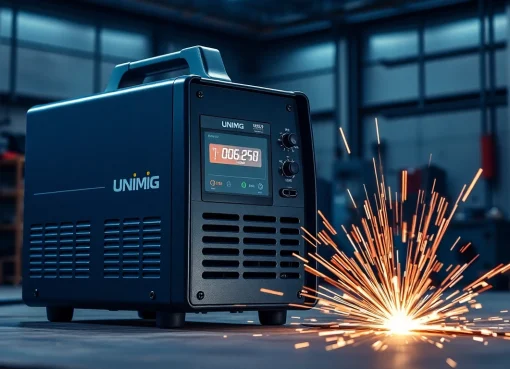Leading Filling Machine Manufacturers: Quality Solutions for Efficient Production

Understanding Filling Machines
Filling machines are essential components in various industries, streamlining the packaging process by efficiently dispensing contents into containers. Whether it’s liquid, powder, or granular products, these machines ensure precision, speed, and consistency. The demand for reliable filling machines has propelled numerous manufacturers into the spotlight, each offering unique solutions to meet specific industry requirements. If you are considering investing in a filling machine, it’s crucial to explore the options available among Filling Machine Manufacturers.
What Are Filling Machines?
Filling machines are automated devices used to fill containers with a product, either liquid or solid. They are designed to facilitate the packaging process, ensuring that products are efficiently filled into bottles, jars, boxes, or any desired packaging type without spillage or wastage. A filling machine can be simple or highly complex, depending on the requirements of the operation and product being packaged.
Types of Filling Machines
Filling machines can be categorized based on various criteria, including the type of product they handle, the method of filling, and the level of automation.
- Liquid Filling Machines: These machines cater to the filling of liquids, ranging from water to viscous substances like syrups and creams. They can be further divided into gravity fillers, piston fillers, and pump fillers.
- Powder Filling Machines: Suitable for dry products such as flour, sugar, and spices, these machines typically utilize auger filling technology or vacuum systems for precise dispensing.
- Granule Filling Machines: These are designed for granular products like seeds, grains, and pellets, often using vibratory or volumetric filling techniques.
- Semi-Automatic vs. Fully Automatic: Semi-automatic machines require some manual input while fully automatic machines complete the filling process autonomously, often integrating capping and labeling functions.
Applications Across Industries
The versatility of filling machines allows them to serve various sectors across the economy. Here are some key industries that rely heavily on filling machines:
- Food and Beverage: Ensuring precise filling in beverage bottling, dairy packaging, and food products.
- Pharmaceuticals: Filling syringes or vials with medication requires high precision to avoid contaminations.
- Cosmetics: For lotions, creams, and serums, filling machines aid in maintaining product integrity and cleanliness.
- Chemicals: Machines designed for hazardous materials ensure safe and efficient filling processes.
- Household Products: Common household items like detergents and cleaners are effectively filled using specialized machinery.
Key Features of Modern Filling Machines
Automation and Efficiency
Modern filling machines are increasingly automated, minimizing human intervention which reduces errors and increases output rates. Automation comes with advanced features such as sensors and controls that monitor the entire filling process, enhancing both speed and efficiency. For instance, automatic filling systems can process hundreds of containers per minute, drastically improving operational capacity.
Precision and Accuracy
One of the most critical aspects of filling machines is the precision with which they dispense the product. High-quality machines are designed to minimize inaccuracies, ensuring that each container receives the correct volume. Technologies like load cells for weighing and adjustable fill heights enhance the machine’s capability to meet rigorous quality standards.
Material Considerations
The selection of materials used in manufacturing filling machines is imperative for their longevity and performance. Stainless steel is commonly used due to its resilience against corrosion and ease of cleaning, essential in industries with strict hygiene requirements. Furthermore, manufacturers are increasingly exploring sustainable materials to reduce environmental impact, aligning with global sustainability goals.
Choosing the Right Filling Machine Manufacturer
Factors to Consider
When selecting a filling machine manufacturer, several factors should guide your decision:
- Product Compatibility: Ensure the manufacturer has experience in your specific industry and can provide machines suitable for your product.
- Production Capacity: Evaluate whether the manufacturer can meet your production demands.
- Customization Options: Look for flexibility in machine design to accommodate various filling methods and container types.
- Cost and Return on Investment: Analyze the overall investment including maintenance and operation costs versus expected productivity gains.
Evaluating Manufacturer Reputation
Manufacturer reputation is pivotal when determining the right partner for your needs. Conduct thorough research by checking customer reviews, industry forums, and performance history. A reputable manufacturer typically offers proven solutions backed by customer testimonials. Industry certifications and compliance with international standards can also serve as indicators of reliability.
Customer Support and Maintenance
Post-purchase support is crucial for minimizing downtime and maintaining operational efficiency. Evaluate the customer service options the manufacturer provides, including technical support, spare parts availability, and training for your staff. A company committed to ongoing customer relationships will generally offer comprehensive service packages.
Top Filling Machine Manufacturers in the Market
Industry Leaders Overview
The market for filling machines is populated with many players, but few stand out due to their advanced technology and extensive service networks. Some of the leading manufacturers include:
- Accutek Packaging Equipment: Known for their diverse range of liquid filling machines, capping machines, and complete packaging solutions, offering extensive customization.
- Cozzoli Machine Company: Specializes in liquid filling, providing equipment that balances performance with affordability.
- E-PAK Machinery: Renowned for manufacturing high-quality liquid filling machines that integrate seamlessly with capping and labeling operations.
- ProSys: Offers innovative filling systems tailored to various product types, promoting high efficiency.
Innovative Solutions from New Entrants
While established manufacturers dominate the market, new entrants continue to innovate, providing fresh solutions that challenge the status quo. For example, companies that focus on automated systems are gaining traction, introducing advanced robotics and AI-driven technologies that enhance production speed and reduce labor costs.
Comparative Analysis of Offerings
It’s beneficial to perform a comparative analysis of different manufacturers’ offerings. Consider factors such as technology, standards compliance, available features, and customer service. Manufacturers with a strong focus on technology integration, sustainability, and customization options generally offer better solutions to meet diversified market needs.
Future Trends in Filling Machine Manufacturing
Technology Advancements
Looking ahead, the filling machine industry is poised for substantial advancements in technology. Machine learning and AI will play significant roles in predictive maintenance and operational optimization, allowing companies to reduce inadequacies and improve overall performance. Robotic integrations are also expected to enhance flexibility and scalability in packaging lines.
Sustainability Practices
With growing concerns over environmental sustainability, manufacturers are adopting eco-friendly practices. This includes not only the materials used but also the operational processes that minimize waste and energy consumption. Equipment designed with energy efficiency in mind can significantly lower operational costs while meeting regulatory standards.
Market Growth Projections
The market for filling machines is projected to see substantial growth due to increased demand from various sectors, particularly food and beverages, pharmaceuticals, and consumer goods. As these industries evolve, the need for faster, more reliable, and versatile filling solutions will continue to rise, driving innovation and investment in filling machine technology.



Leave a Comment